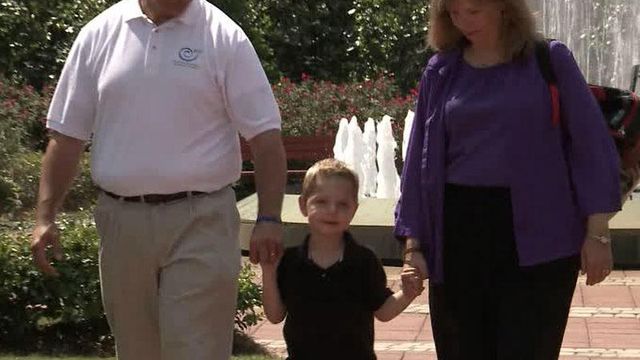Duke researchers find gene mutation for childhood disorder
Every person has genetic mutations. Most have no harmful effects, but some can lead to disabling disorders. Duke researchers recently identified a gene mutation for a disorder that is commonly misdiagnosed in children as epilepsy.
Posted — UpdatedDuke researchers recently identified a gene mutation for a disorder that is commonly misdiagnosed in children as epilepsy.
Matthew Wuchich is one of those children. When he was 3 months old, he began to show occasional signs of weakness and paralysis that could last minutes or hours.
Doctors first thought it was epilepsy, so they put him on medications that didn't work.
"We did not get a diagnosis until he was 18 months old," his mother, Renee Wuchich, said.
Though Matthew's episodes of paralysis are momentary, the disorder has kept him from reaching developmental milestones. Clinical exams helped doctors eventually determine that Matthew has alternating hemiplegia of childhood, or AHC.
"It is a very severe condition for which treatments are only partially effective," said Dr. David Goldstein of the Duke Center for Human Genome Variation.
Two and a half years ago, Matthew's father, Jeff Wuchich, who is president of the AHC Foundation, won a $250,000 Pepsi Refresh grant for research.
"I had to pinch myself to make sure it was real," he said.
The funding allowed researchers at Duke and University of Utah to conduct the study that revealed an AHC gene mutation.
"Out of about 100 patients that were tested, three-quarters had the mutation," said Duke pediatric neurologist Dr. Mohamad Mikati. "Before there was just a clinical diagnosis. Now, there's going to be a test that's going to help confirm the diagnosis."
That means children can be diagnosed earlier and their symptoms treated more effectively. The discovery could lead to the development of a new drug to correct the mutation.
"There's a lot of hope now that we could potentially cure this in the next 10 to 15 years," Jeff Wuchich said. "Of course, the biggest barrier is money."
There have only been about 300 diagnoses of AHC in the United States, but researchers say this discovery potentially benefits many more people than those with this gene mutation. Goldstein says it shows that genetics really can get to the bottom of unusual conditions in the human population and help bring researchers closer to finding cures for a whole range of rare conditions.
Anyone with questions about AHC, intractable epilepsy or other genetic disorders can contact the Duke Center for Human Genome Variation. Goldstein can be emailed at d.goldstein@duke.edu. Call Mikati's office at 919-668-4073 and ask for Lindsay Johnson.
• Credits
Copyright 2024 by Capitol Broadcasting Company. All rights reserved. This material may not be published, broadcast, rewritten or redistributed.





